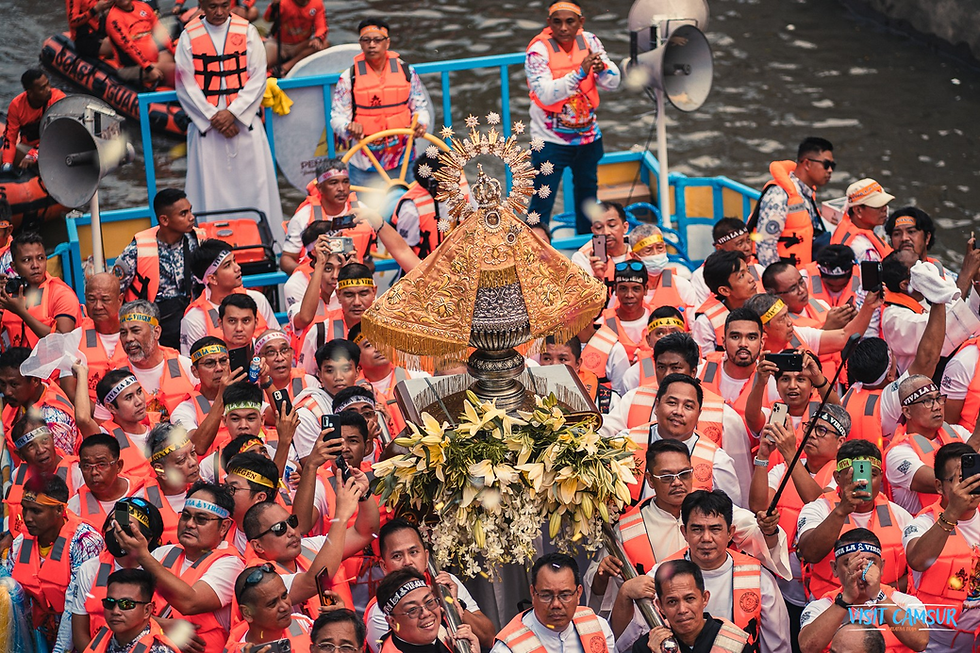Homily of H.E. Most Rev. Charles John Brown D.D., Apostolic Nuncio to the Philippines
September 17, 2023 | Solemnity of Our Lady of Peñafrancia
Minor Basilica and National Shrine of Our Lady of Peñafrancia, Naga City
My dear brothers and sisters in Christ here gathered this morning for the wonderful feast day of Nuestra Señora de Penafrancia, here in this beautiful minor basilica, together with your beloved Archbishop, His Excellency the Most Rev. Rolando Tirona, Archbishop of Caceres, priests concelebrants, deacons, seminarians, women, religious who are here, but especially you, the faithful people of the Archdiocese of Caceres, and other dioceses here in Bicol, and other dioceses throughout the Philippines who were gathered here this morning, together as children of Mary, as devotees of Our Lady of Penafrancia, to tell her how much we love her, how much we appreciate her intercession, how we rely on her protection.
It's a joy for me as the Apostolic Nuncio, to be with you this morning with this amazing celebration. I will be going to Rome next week to see Pope Francis, and as I mentioned last night when I was preaching in the Vigil Mass, I will be bringing to Pope Francis the assurance of all of your prayers for the Holy Father. Holy Father Pope Francis relies on your prayers. He always asks me to ask you, the beloved people of the Philippines, who are so close to his heart, to pray for the Pope. Pray for Pope Francis, especially here in this minor basilica which has a special link to the Holy Father, a special link to Rome. How glorious it is to be with you this morning. To give honor to Mama Mary, our beloved Ina, Our Lady of Penafrancia.
Separation from God
Our first reading this morning, brothers and sisters, comes from the very first book of the Bible. If you open your Bible and go to the first pages, you'll find the reading that we heard this morning from the Book of Genesis (Gen 3:9-15). What did we hear? We heard in the Book of Genesis, in our first readings, we heard about the effects of sin on our first parents: Adam and Eve in the Garden of Eden. We hear how God had looked for Adam in the Garden of Eden. God says to Adam, “Where are you?”, but Adam says, “I've heard you in the garden, but I was afraid.” Adam was afraid of God. Why was he afraid of God? Adam had been created as a child, as a son of God, in glorious splendor, in paradise, in Eden, with his beautiful wife Eve. But now, in the first reading, he's afraid of God. He hides from God. He's distanced from God. We could say he's separated from God. Why has this happened? This happened because Adam and Eve were tricked or deceived by the serpent, by the devil. They were deceived into being disobedient to God. God told them “Do not eat from the fruit of that tree”, and the serpent tempts Eve, and then Adam. They ate from the tree. They disobeyed God. Then what happens? We have this separation of Adam and Eve from God. Adam, who was the beloved Son of God, who existed in the beautiful communion of love with God, now is afraid of God, and hides from God in the garden. God comes looking for Adam, and Adam is hiding. Then, when God interrogates Adam, Adam begins to blame Eve. Eve is the one. She gave me the fruit from the tree. So, we see not only is Adam separated from God, but now Adam is blaming Eve. There’s a separation between Adam and Eve, a kind of an antagonism and enmity, difficulty, discord.
All of these things are the effect of sin. Sin brings separation. Sin brings division. We see that in the first reading this morning. Sin divides us from God. Sin in our heart, when we sin, it makes us ashamed. We hide from God. We retreat from God. We go into our own little world, trying to stay away from God because we are ashamed. That's what happened to Adam and Eve in the first reading, and it's very tragic.
You know the word in English for the serpent is the devil, right? The devil, which comes from the Greek word “diabolos” which comes into different words like diabolical in English, with diavolo in Italian. What does the word diabolos literally mean? What is the root meaning of diabolos/devil? It's “the one who separates”, “the one who causes division”, “the one who causes separation”. That's what the devil does. That is what the devil does. First, he tricks us, he deceives us. Because any sin, any temptation looks like something good. Looks like something attractive. If it wasn't attractive to us in some ways, it wouldn't be a temptation. As it was for Adam and Eve. The fruit on the tree looked attractive to them, but God had told them, “Do not touch them”, and yet they disobey God.
So, sin always involves a trick, a deceiving. That is why the devil is the father of division, but also the father of lies, the father of untruth. So, our poor first parents, Adam and Eve are tricked, deceived, and then LED into this situation of separation from God. It's so sad to see that in our first parents.
So, we have that scene in the first reading: of separation, of fear, of shame, of division; and then, we go to the gospel (Jn. 19:25-27) that we heard, read this morning by the deacon.


Archbishop Brown joins the Fluvial Procession in honor of INA, Reina nin Bicolandia | photo from Visit Camsur
Unity with God
We go fast forward to the Calvary, to the foot of the cross. What do we see there? We see at the foot of the cross, standing there, Mary, the mother of Jesus, a relation of Mary, Mary's sister, Mary the wife of Clopas, Mary Magdalene, and Saint John. We see a little group of disciples, apostles, gathered close to Jesus in His suffering on the cross. We see unity at the foot of the cross. Of course, we see suffering, but we see unity. St. John, Our Lady, Mary Magdalene, Mary the wife of Clopas, gathered with Jesus in His suffering, united with Him, close to him. In some ways, it's the opposite of what we saw in the first reading in Genesis: division, separation. We see unity in the gospel. The women with Jesus.
Then we hear the Gospel, in which Jesus says to us and to Saint John, “Behold your mother.” “This is your mother.” He says that to us as Catholics today, Mary is our mother. Then the Gospel tells us that “from that hour the disciple Saint John took Mary into his house.” “Took Mary into his home.” Again, a sign of unity with Mary, a sign of closeness with Mary.
So, we have these two contrasting scenes in Genesis and the Gospel of John. We have the first scene: division, lies, hatred, shame. Then the second scene: unity, truth, and love. Jesus gives us the gift of his mother. What a beautiful gift of love that Jesus gives us in that unification at the foot of the cross.
So, Mary, Our Lady of Penafrancia is the mother of unity. She's the mother of unity. She's the mother of truth. She's the mother of love. That is why she's our mother. That's why we're so devoted to her. Because coming close to Mary always brings us close to Jesus, as on the cross, Mary is at the foot of the cross with Jesus. Mary creates that unity among us.
Later on, after the gospel, when we come to the Feast of Pentecost, when the Holy Spirit comes down from heaven like tongues of flame on all the apostles, inspiring them, encouraging them to go out through the whole world, to proclaim the gospel. Who is with them? Mary. Our Lady praying with them (cf. Acts 1:13 – 2:4). Our Lady, source of unity, center of unity, center of love, center of truth.
Instruments of Unity, Love, and Truth
So, for us, as devotees of Our Lady of Penafrancia, us, all of us who rely on her intercession, that in our own way, try to be instruments of unity. Instruments of unity in a world where there is sin. Because brothers and sisters, the devil has been defeated, but he is still active. His final defeat is certain, but he's still active. Active with his lies, active with his work of division, active with his work of hatred. He's still active. In fact, the Scriptures tell us, he's especially active because he knows that his end is near. So, we need to be children of Mary, Mary mother of unity, Mary mother of truth, Mary mother of love.
Let us, in our own families, be sources of unity, of love, of truth, of forgiveness. Let us, let all of us, be people who speak the truth, who love the truth, who will not be captivated or tricked by the father of lies, the father of darkness, the Evil One.
Let us, all of us, try to be people of love, who love our brothers and sisters, who also love those who don't love us. Because isn't that the message of Jesus from the cross? Jesus prayed for the ones who were killing Him, who were putting Him to death. He prayed for them (cf. Lk. 23:34). Jesus shows us what we must do. We must love not only the people who love us. Because that is not so hard to do. When we're loved by someone, it's easy to love them back, isn't it? But when someone doesn't love us, it's not so easy. With the power of Jesus and the intercession of Mary, Our Lady of Penafrancia, all things become possible.
So, dear brothers and sisters in Christ, for me as your apostolic nuncio, it gives me so much joy to be with you here in Naga City, here with your beloved Archbishop Tirona, your priests, sisters, deacons, seminarians, and all of you, to give thanks to God for the gift of Jesus from the cross, the gift of Mary to be our Mother. Let’s try and strive to be people who live in unity, people who live in truth, people who live in love.
Last night, your Archbishop announced that beginning now, you have one year of preparation to celebrate. A year from now, the 100th anniversary of the elevation of this church to the status of minor basilica. A year of preparation is beginning now. How glorious that is. Let's make the most of this year, so we can be instruments of love, unity and peace, here, where we live, in Bicol, throughout the Philippines, and throughout the entire world.
So, my dear brothers and sisters in Christ, for me, as a papal nuncio, I salute you, I congratulate you on this wonderful feast day and I join you in saying, Viva la Virgen!
Transcribed by Joel Vasquez Ocampo


Comments